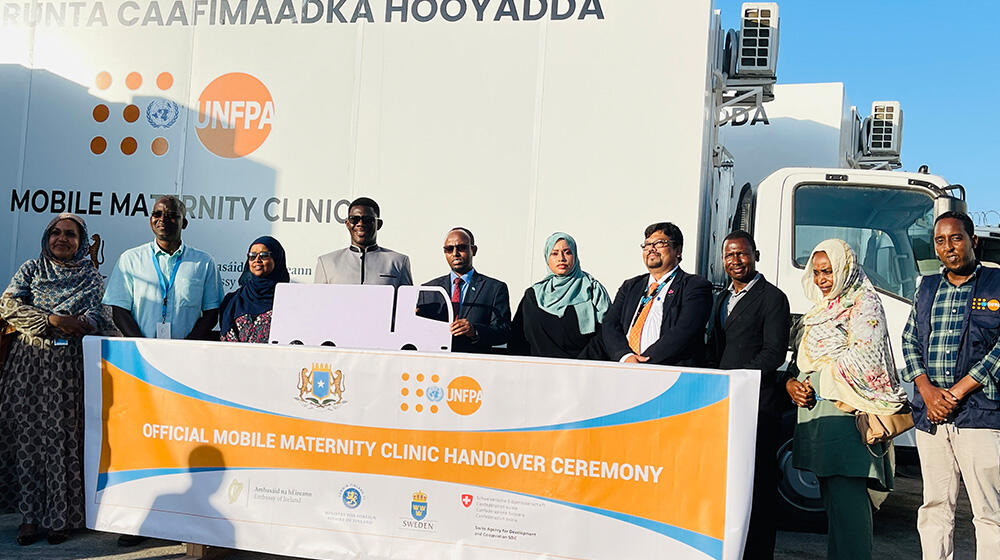Mogadishu (27 March, 2023) - The United Nations Population Fund (UNFPA) has launched a Mobile Maternity System as part of efforts to scale up its humanitarian response in Somalia. The launch took place today in Mogadishu with UNFPA handing over five units of the Mobile Maternity Clinics (MMCs) to the Ministry of Health, Federal Government of Somalia. The high-level handover ceremony was attended by the Minister of Health Dr Ali Haji Adam, who received the Units on behalf of the Federal Government of Somalia. Also in attendance was the SODMA Commissioner, Mr. Mohamud Moalim Abdulle, and the Deputy Special Representative of the Secretary-General, Adam Abdelmoula, who also serves as the Humanitarian Coordinator.
The MMCs which were procured by UNFPA with funding from its Donors under the Somalia Multi Partner Trust Fund (MPTF) by Sweden, Switzerland and Finland, as well as Irish Aid as part of their regional humanitarian support will improve access to life-saving maternal and newborn health (MNH) services and thus mitigate the impact of the humanitarian crisis in the country. The truck-mounted emergency obstetric and newborn care (EmONC) units will be positioned where health facilities are absent and demand is high to provide safe deliveries and life-saving MNH services for populations affected by the humanitarian situation.
Presiding over the ceremony, the Federal Minister for Health, Dr Ali Haji Adam said; “Considering the prolonged conflict that has afflicted the Somali community, I believe that the introduction of mobile maternity clinics will prove to be a great help to mothers who lack access to traditional healthcare facilities. This initiative is a great start and holds promise for a brighter future. We are happy to receive these mobile clinics from the UNFPA and the donors, as address a real need.”
The five mobile maternity units is expected to serve a total population of 250,000 to 375,000 people in five different locations: Mogadishu, Beletweyne, Baidoa, Dollow, and Kismayo. They will provide essential MNH services, including safe deliveries by qualified midwives and healthcare providers. It is estimated that 10,000 to 15,000 pregnant women will receive life-saving SRH services, contributing to the reduction of preventable maternal mortality among the displaced populations. Additionally, the units will provide modern contraceptive options for voluntary uptake to reduce the unmet need for family planning among the affected population. Furthermore, the maternity units will provide confidential and competent clinical management of rape to survivors of rape.
Niyi Ojuolape, Country Representative UNFPA, Somalia, stated, “The mobile maternity units will be a game-changer in addressing SRH needs in humanitarian crises, improving access to the hardest to reach and the marginalized populations, promoting equity in the humanitarian response."
Somalia is currently facing the longest and most severe drought in its history, with five consecutive failed rainy seasons. The climatic shocks and conflicts in Somalia have caused 3.8 million people to be displaced, with marginalized communities being affected the most. According to the Humanitarian Needs Overview (HNO) 2023 report, only 39 percent of pregnant women who are displaced have access to antenatal care services and life-saving sexual and reproductive health (SRH) services, while 86 percent reported facing barriers in accessing health services.
UNFPA is a champion in the promotion of universal access to SRH in Somalia and continues to work to ensure that all Somali women and girls are reached in time with quality services, especially the displaced and vulnerable.



